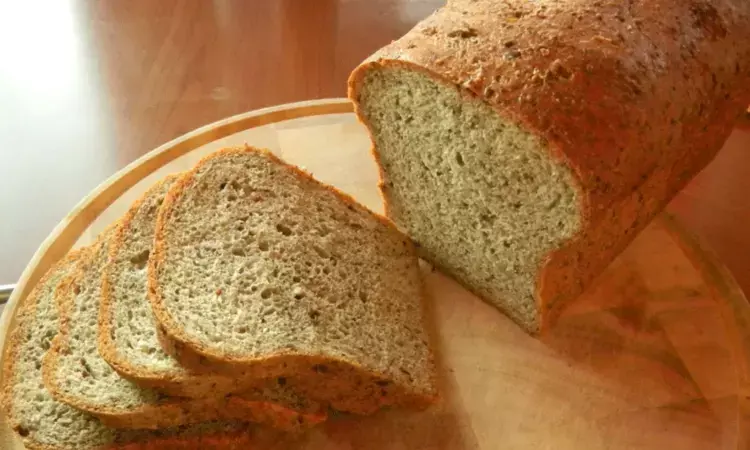- Home
- Medical news & Guidelines
- Anesthesiology
- Cardiology and CTVS
- Critical Care
- Dentistry
- Dermatology
- Diabetes and Endocrinology
- ENT
- Gastroenterology
- Medicine
- Nephrology
- Neurology
- Obstretics-Gynaecology
- Oncology
- Ophthalmology
- Orthopaedics
- Pediatrics-Neonatology
- Psychiatry
- Pulmonology
- Radiology
- Surgery
- Urology
- Laboratory Medicine
- Diet
- Nursing
- Paramedical
- Physiotherapy
- Health news
- Fact Check
- Bone Health Fact Check
- Brain Health Fact Check
- Cancer Related Fact Check
- Child Care Fact Check
- Dental and oral health fact check
- Diabetes and metabolic health fact check
- Diet and Nutrition Fact Check
- Eye and ENT Care Fact Check
- Fitness fact check
- Gut health fact check
- Heart health fact check
- Kidney health fact check
- Medical education fact check
- Men's health fact check
- Respiratory fact check
- Skin and hair care fact check
- Vaccine and Immunization fact check
- Women's health fact check
- AYUSH
- State News
- Andaman and Nicobar Islands
- Andhra Pradesh
- Arunachal Pradesh
- Assam
- Bihar
- Chandigarh
- Chattisgarh
- Dadra and Nagar Haveli
- Daman and Diu
- Delhi
- Goa
- Gujarat
- Haryana
- Himachal Pradesh
- Jammu & Kashmir
- Jharkhand
- Karnataka
- Kerala
- Ladakh
- Lakshadweep
- Madhya Pradesh
- Maharashtra
- Manipur
- Meghalaya
- Mizoram
- Nagaland
- Odisha
- Puducherry
- Punjab
- Rajasthan
- Sikkim
- Tamil Nadu
- Telangana
- Tripura
- Uttar Pradesh
- Uttrakhand
- West Bengal
- Medical Education
- Industry
Replacing regular flour in white bread with new chickpea flour can lower blood sugar, increase longevity

UK: The novel use of a whole cell pulse flour created from chickpeas in white bread replacing refined flours can lower blood sugar levels and keep you fuller for longer, researchers from King's College London and the Quadram Institute report in a recent study.
"Replacing refined flours with cellular chickpea flour in a white bread stimulates an anorexigenic gut hormone response and potentially improves dietary strategies for treating and preventing cardiometabolic diseases," the researchers wrote in their study published in The American Journal of Clinical Nutrition.
Bread that was 30% cellular chickpea flour lowered the blood glucose levels by 40% versus the regular white wheat flour bread due to the slower breakdown of starch in the cellular flour during digestion.
Consuming healthy flours made from milling whole grains or seeds (pulses), including lentils, beans and chickpeas, is known to decrease the risk of heart disease and support healthy weight maintenance. Processed foods composed of highly refined ingredients disrupt food microstructure and raise rates of carbohydrate absorption; thereby, it is essential to introduce new methods in food technology to help create whole-cell flours that preserve dietary fibre and have beneficial nutritional qualities for improved health.
Against the above background, Balazs H. Bajka, King's College London, London, United Kingdom, and colleagues aimed to determine the effects of replacing wheat flour with cellular chickpea flour on postprandial gut hormones, insulin, glucose, and satiety responses to white bread.
For this purpose, the researchers conducted a double-blind, randomized crossover study in which postprandial blood samples and scores were collected from 20 healthy human participants after they consumed bread enriched with 0%, 30%, or 60% (wt/wt) cellular chickpea powder (CCP, 50 g total starch per serving).
The authors reported the following findings:
- Bread type significantly affected postprandial glucagon-like peptide-1 (GLP-1) and peptide YY (PYY) responses.
- The 60% CCP bread elicited significantly elevated and sustained release of these anorexigenic hormones and tended to increase fullness.
- Bread type significantly influenced glycemia and insulinemia, with 30% CCP bread eliciting a >40% lower glucose iAUC than the 0% CCP bread.
- In vitro, studies revealed slow digestion of intact chickpea cells and explained the physiologic effects mechanistically.
The researchers conclude, "A simple switch to a cellular chickpea blend in recipes of a staple food (bread) can boost the feeling of fullness, which in turn could bring these beneficial effects to various products designed to help discourage overeating and help prevent or treat diet-related conditions, such as heart disease and type 2 diabetes."
Reference:
Bajka, B. H., Pinto, A. M., Perez-Moral, N., Saha, S., Ryden, P., Ahn-Jarvis, J., van der Schoot, A., Bland, C., Berry, S. E., Ellis, P. R., & Edwards, C. H. (2023). Enhanced secretion of satiety-promoting gut hormones in healthy humans after consumption of white bread enriched with cellular chickpea flour: A randomized crossover study. The American Journal of Clinical Nutrition, 117(3), 477-489. https://doi.org/10.1016/j.ajcnut.2022.12.008
Dr Kamal Kant Kohli-MBBS, DTCD- a chest specialist with more than 30 years of practice and a flair for writing clinical articles, Dr Kamal Kant Kohli joined Medical Dialogues as a Chief Editor of Medical News. Besides writing articles, as an editor, he proofreads and verifies all the medical content published on Medical Dialogues including those coming from journals, studies,medical conferences,guidelines etc. Email: drkohli@medicaldialogues.in. Contact no. 011-43720751


